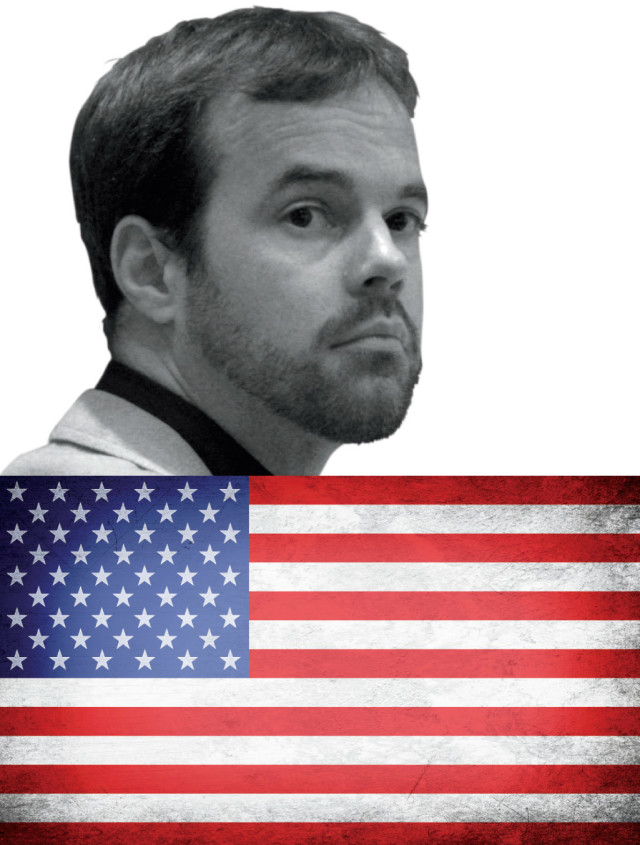
Meet the Oregonian Who Helped Transform the Patriot Act
One day I told Ron Wyden, Oregon’s senior US senator, that I wanted to write a story about his most secretive staffer, the man who helps Wyden formulate his positions on national security. The senator’s press team had already gently explained why this would never happen. “He’ll never agree to it,” they promised. (When you work on issues that inspire the CIA to hack congressional computers, you keep a low profile.) Wyden clapped his hands, the gravelly yelp Oregonians know well from his 19 years in Congress booming off the walls of the tiny office where we met. “John would be great!” Wyden exclaimed. “He deserves it.” Wyden and John Dickas do make an interesting pair.
Dickas, a boyish 36-year-old from Beaverton, is Wyden’s senior staffer charged with research and policy guidance on national security issues. Wyden is the second-ranking Democrat on the Senate’s Select Committee on Intelligence—the powerful, and itself highly secretive, group of 19 senators charged with overseeing the nation’s intelligence agencies.
Dickas thus helps Wyden craft his views and public statements on some of the most highly charged questions in American public life: matters like the vast electronic eavesdropping programs revealed by the exiled Edward Snowden, the use of drones, and the torture of detainees. Since at least 2005, Wyden has made many statements, impassioned but often oblique, on surveillance and other post-9/11 extensions of clandestine power. The senator often takes the position that the USA Patriot Act erodes civil liberties, reserving much of his fire for the section of the act that allows the government to see whom you’ve called and when.
“What if you call your psychiatrist at 3 in the morning?” Wyden told me last year. “You don’t need to know the content of that call for it to be outside government reach.”
Wyden’s public statements have made him one of few prominent congressional critics of the War on Terror’s intelligence regime. Dickas, who has worked on Wyden’s staff for 10 years, is the man he turns to in private to craft those statements. Wyden gets the headlines. Dickas stays at the office until 10 p.m., poring over highly classified reports that only he and the rest of the committee senators and senior staffers are permitted to read.
Dickas has used his select security clearance to exert a level of influence on national debate unusual for a single congressional staffer. In a 2013 article by New Yorker national correspondent Ryan Lizza, Wyden called Dickas “the hero of the intelligence reform movement”; the story noted how Dickas steered Wyden’s grilling of James Clapper, essentially the nation’s top-ranking spy, on NSA surveillance of Americans. This May, Dickas coauthored a piece with Wyden in Foreign Affairs. Under the headline “Too Many Secrets,” the story lambastes the executive branch’s reliance on its own secret interpretation of the Patriot Act to authorize domestic surveillance and the Bush Justice Department’s notorious redefinition of “torture.” The story’s first paragraph contains this sentence: “[O]penness is not just a cherished American value; it is a core element of American strength.”
Still, Dickas can’t say much about what he sees and hears. Even when he’s lounging about on his dad’s houseboat on the Willamette, Dickas is often legally compelled to respond “no comment.” And make no mistake, the issues Wyden and Dickas confront are matters of life and death. The same classified reports they’ve seen have convinced some of Wyden’s colleagues—Republicans like former member Saxby Chambliss, yes, but also Dianne Feinstein, the committee’s top Democrat—that the surveillance that has outraged many Americans is well worth it.

Image: Motoya Nakamura
The following is an edited transcript of a few exchanges with Dickas. He is understandably circumspect about his work, so we added our own notes to expand on his answers. As we went to press, Congress partially rolled back the telephone surveillance that Snowden disclosed and that Wyden battled, after the Oregon senator featured prominently in weeks of debate. Meanwhile, here’s what the other Oregonian with a privileged view into the national security abyss has to say.
Q: Why the intelligence beat?
A: The September 11th attacks happened while I was in school, and that obviously thrust counterterrorism onto the front burner as a policy issue. And one particularly important aspect of that was the challenge of protecting both security and American rights and values at the same time.
NOTE: As a student, Dickas knew he wanted to do something with public service but wasn’t sure what. He graduated from Notre Dame in 2001 without a clear direction, but went to Washington, DC, to study public policy at George Washington University. Side note on the value of a liberal arts education: in addition to his congressional work, he has appeared on Jeopardy. He led for a while but fell behind during Double Jeopardy.
So September 11 shaped your career path? Sure, absolutely. When I was coming out of grad school it was clear that some of the most important challenges that our country was facing related to national security and finding the smartest way to respond to the threat of terrorism. So that definitely helped draw me into this field—there was clearly a lot of important work for people to do here.
NOTE: The Senate’s Intelligence Committee is a supergroup, enlisting that body’s majority and minority leaders as well as members of the Appropriations, Armed Services, Foreign Relations, and Judiciary Committees. The committee holds the purse strings for the CIA, Defense Intelligence Agency, and NSA, as well as spies who work for the departments of State, Treasury, and Energy. The committee tackles major oversight projects like comparing the statements of Bush administration officials in the lead-up to the Iraq war with the evidence they had at the time. (It didn’t look good.)
How did you end up with Wyden? I spent my first year or so on Capitol Hill working for a senator from Florida, who retired in 2005. Coming from Oregon, I’d always been a fan of Ron’s, and he and my first boss worked together a lot on intelligence issues, and on reducing excessive secrecy in particular. So when Ron had an opening for an intelligence and national security policy staffer, I definitely jumped at the chance to work for him.
NOTE: Dickas worked for Bob Graham of Florida, who was also on the intelligence committee. In 2006, a year after hiring Dickas, Wyden raised the alarm about the Patriot Act, calling it “a case study of the damage secrecy can do in the struggle for both security and freedom.”
Can a congressional staffer make a difference? Definitely. If you’re lucky enough to find a member of Congress who shares your views on public policy and has a serious focus on issues that you want to work on, then it’s definitely possible. It takes a lot of patience, and a willingness to accept that you won’t win every time, but Congress is where our country’s laws are written, and it’s where the big decisions about public spending are made.
NOTE: What Dickas doesn’t say here is that no elected official like Wyden can spend the time Dickas can with a single issue. When the next espionage movie shows a bunch of DC bigwigs huddled for a briefing on the latest crisis, a Hollywoodized version of Dickas could be the one delivering the facts.
People in western states seem to favor more scrutiny of the NSA. Did growing up an Oregonian inform your work? Both progressives and conservatives in the Northwest tend to have a strong libertarian streak, and people tend to take their individual rights pretty seriously. That’s probably why conversations and debates about how to protect both American security and our constitutional rights resonate naturally with a lot of Oregonians.
NOTE: Wyden released letters between himself and the Bush Justice Department from 2007–2008 that revealed that the government had devised a “sliding scale” when it came to its application (or disregard) of Geneva Convention standards in its treatment of terrorism detainees.
Coming out of Beaverton High School, what kind of career did you envision? Who did you read for fun in high school and college? I was probably more interested in football than in any future career goals, but I definitely remember my parents talking about how it can be more rewarding to do something that makes the world better rather than just something that pays a lot of money. My favorite Oregon author is probably Ken Kesey.
Sometimes a Great Notion, or Cuckoo’s Nest? Cuckoo’s Nest, definitely. I love the way the story is told from the Chief’s point of view. The more obvious approach would have been to tell it from McMurphy’s point of view.
NOTE: One Flew Over the Cuckoo’s Nest is the story of a man witnessing abuses inside an insane asylum, and his inability to stop them.
Do you and the senator feel active push-back from the intelligence community?
I won’t speak for anyone besides myself, but the people I know at different intelligence agencies are an incredibly dedicated and hard-working bunch. It’s important to listen to them and get an understanding of how different policy decisions would impact their agencies, but I don’t think it’s fair to ask them to make the overarching policy decisions themselves. Deciding things like what the rules for protecting Americans’ privacy should be, or how to balance the benefits of secrecy with the public’s right to know, is a job for elected policy makers.
NOTE: Last year, it was revealed that the CIA hacked computers used by Senate staffers working on the select committee’s report on the agency’s interrogation practices. Before those incidents became public, Wyden used a public hearing to ask CIA Director John Brennan if federal anti-hacking laws applied to his agency. (Brennan demurred, first in person, then in a somewhat equivocal written response.) Wyden has also repeatedly cited the episode in his public criticism of what he has called the CIA’s “culture of misinformation.” Wyden often pushed for more civil liberties protections during debates over the Patriot Act and government surveillance. For example, Wyden called the collection of bulk phone records “intrusive” in 2013.
Is Congress doing its job on this front? Public discussions about surveillance policy are a healthy thing for our country. When I talk to friends and family in Oregon, they don’t expect to know every detail about how the intelligence agencies operate, but they do expect those agencies to follow rules that the public can understand. And debates in Congress can do a lot to ensure that our government gets those rules right.
NOTE: The Snowden revelations seem to have significantly altered the “debates in Congress” to which Dickas refers. Those fighting for more government transparency, like Wyden, had to wait nearly a decade for their views to attract significant support. In the debate this spring over the Patriot Act’s reauthorization, both Democrats and Republicans united around revisions to curtail the surveillance and data collection tactics Wyden has criticized. Wyden called the resulting USA Freedom Act “the most significant victory for Americans’ privacy rights in more than a decade.”
Will your work change with the Democrats in the minority? Senate rules usually require a pretty broad consensus to get anything significant done, so the minority still matters a lot. I expect that most of the big debates that were going on in 2014 are going to continue into 2015. Ron’s definitely a senator who stands on his principles regardless of the issue. Working on intelligence policy for him means you’re often in the minority in one way or another.
